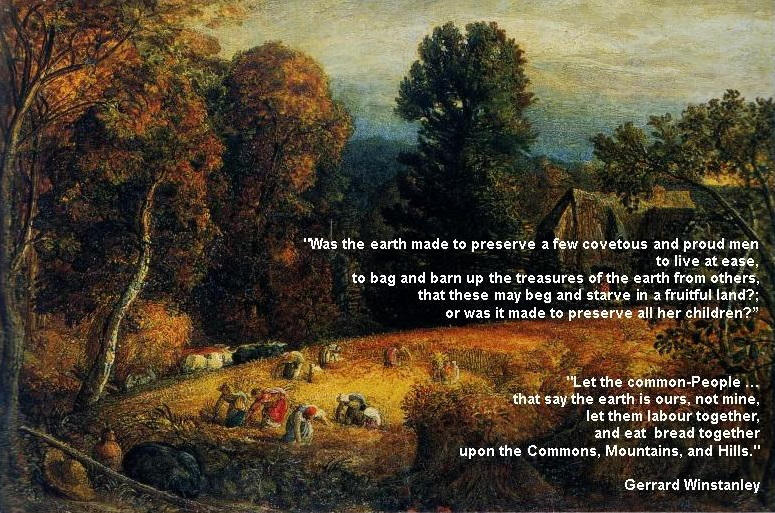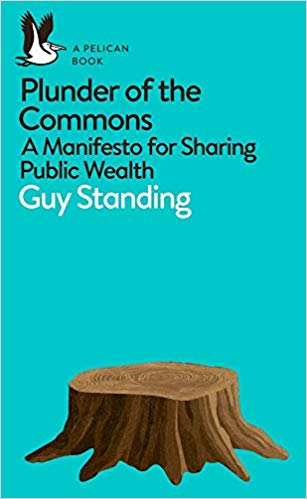
Photo:wix.com
“The commons” is a useful term because it helps describe a nearly ubiquitous pathology of modern life, the enclosure of the commons. Governments throughout the world are conspiring with, or acquiescing in, the plunder of our common wealth. This is the net effect of the privatization of public resources and services being carried out as part of economic globalization.’-David Bollier
Yes. It is true. We are, in the words of the Diggers of 1649, seeking to make "the Earth a common treasury for all … not one lording over another, but all looking upon each other as equals in the creation". Carpe Diem!
A must read to understand the past, present and the future of our commons:
Plunder of the Commons: A Manifesto for Sharing Public Wealth (Pelican Books)- Guy Standing, 29 August 2019
But first, we must get to know and remove the Manifestation of Theft: Austerity, Neoliberalism and the Plunder of the Commons
An aspect of the ongoing Global Transformation has been the systematic plunder of the commons, facilitated and inspired by economic and monetary globalisation and the neo-liberal economic paradigm guiding governments and international agencies.
The neo-liberal agenda unleashed by Thatcher and Reagan in the 1980s has morphed into a system of rentier capitalism, and this has resulted in the plunder of the natural, social, cultural and intellectual commons. This worsening inequality and economic insecurity is particularly disadvantaging the growing precariat with the rise of the gig economy; the prevailing modern, twenty first century road to serfdom.
Poverty, Destitution, Hunger, Homelessness in the Midst of Plenty
This is nothing, but a manifestation of a cruel and inhumane state of affairs
We need to come together to stop the plunder of the many by the few
Neoliberalism and Austerity: The Broken Economic Model
Death and Destruction on Brothers’ Road to Serfdom
The Destruction of our World and the lies of Milton Friedman
The Neoliberal Road to Serfdom
People’s Tragedy: Neoliberal Legacy of Thatcher and Reagan
Neoliberalism destroys human potential and devastates values-led education
Neoliberalism and the rise in global loneliness, depression and suicide
Selling off our Motherland: The Biggest Crime of the Broken Economic Model
Life, death and economics: Austerity is a killer
Britain today and the Bankruptcy of Ideas, Vision and Values-less Education
Austerity driven Homeless children put up in Shipping Containers in ‘Great Britain’
This is why ‘Plunder of the Commons: A Manifesto for Sharing Public Wealth’ is such a compelling thesis for building a new economic system to build a better world.

Plunder of the Commons: A Manifesto for Sharing Public Wealth (Pelican Books)- Guy Standing
'Accelerated by Margaret Thatcher and then even more so in the austerity era, our Commons have been depleted illegitimately. The commons belong to all commoners, and include the natural resources, inherited social amenities and services, our cultural inheritance, the institutions of civil common law and the knowledge commons. The rights of commoners were first established in the Magna Carta and the Charter of the Forest in 1217.'
In this majestic work, Guy Standing not only chronicles the historic plundering of our common wealth. More importantly, he shows how we can reclaim that wealth to address our most urgent contemporary problems: economic insecurity and ecological destruction. This is history, analysis and vision, all at their very best. (Peter Barnes)
In an era of intensifying privatisation, we're rapidly losing sight of the idea that there are things that can be shared communally without being owned by anybody, things that stand outside of the market system - for example rivers, forests, and other natural resources. Many of them have already been sold off to private interests, and most of the rest are being pursued. This incendiary book exposes this process and explores its corrosive effect on society and resource maintenance. (Brian Eno)
'We are losing the commons. Austerity and neoliberal policies have depleted our shared wealth; our national utilities have been sold off to foreign conglomerates, social housing is almost non-existent, our parks are cordoned off for private events and our national art galleries are sponsored by banks and oil companies. This plunder deprives us all of our common rights, recognized as far back as the Magna Carta and the Charter of the Forest of 1217, to share fairly and equitably in our public wealth.
‘Guy Standing leads us through a new appraisal of the commons, stemming from the medieval concept of common land reserved in ancient law from marauding barons, to his modern reappraisal of the resources we all hold in common - a brilliant new synthesis that crystallises quite how much public wealth has been redirected to the 1% in recent decades through the state-approved exploitation of everything from our land to our state housing, health and benefit systems, to our justice system, schools, newspapers and even the air we breathe. Plunder of the Commons proposes a charter for a new form of commoning, of remembering, guarding and sharing that which belongs to us all, to slash inequality and soothe our current political instability.'- Buy the Book
Further complimentary reading:
In Praise of Magna Carta: What happened to Trust and Democracy in Britain?
For God’s sake, we are Citizens not Customers: Justice cannot be for Sale or Profit
After 800 years, the barons are back in control of Britain
Privatization and the Theft of the Commons
The Way Forward

Photo:virtuesforlife.com
The beauty of living simply: the forgotten wisdom of William Morris
Small is Beautiful: The Wisdom of E.F. Schumacher
Wisdom of Lao Tzu: The Path to Virtue, Happiness, and Harmony
Strengthen the Commons -- Now!*
A Commoners’ Manifesto in the interest of the Commons to Build a Better World

Photo:onthecommons.org
A group of commoners who participated in Interdisciplinary political salons of the Heinrich Böll Foundation in Germany in 2008 and 2009 have collectively authored a terrific new manifesto and statement about the commons.
“Strengthen the Commons — Now!” was written in German, but below is a recent English translation, chiefly by Michelle Thorne and Silke Helfrich
How the crisis reveals the fabric of our commons
Over the last two hundred years, the explosion of knowledge, technology, and productivity has enabled an unprecedented increase of private wealth. This has improved our quality of life in numerous ways. At the same time, however, we have permitted the depletion of resources and the dwindling of societal wealth. This is brought to our attention by current, interrelated crises in finance, the economy, nutrition, energy, and in the fundamental ecological systems of life.
These crises are sharpening our awareness of the existence and importance of the commons. Natural commons are necessary for our survival, while social commons ensure social cohesion, and cultural commons enable us to evolve as individuals. It is imperative that we focus our personal creativity, talents, and enthusiasm on protecting and increasing our social wealth and natural commons. This will require a change in some basic structures of politics, economics, and society.
More social prosperity instead of more gross domestic product!
When the economic growth curve drops and the GDP sinks, it seems threatening to us. Yet appearances deceive. The GDP merely maps production figures and monetary flows without regard for their ecological or social value; such numbers do not measure the things we truly need to live – they may simply count their destruction. Social prosperity cannot be measured through such means. A reduction in the GDP does not necessarily signal a reduction in the real wealth of a society. Recognizing this fact widens our perspective and opens doors for new types of solutions.
The commons can help us overcome the crisis, but it requires systematic advocacy. This is our contribution to give the commons a voice.
What are the commons and why are they are significant?
Commons are diverse. They are the fundamental building blocks and pre-condition of our life and social wealth. They include knowledge and water, seeds and software, cultural works and the atmosphere. Commons are not just “things,” however. They are living, dynamic systems of life. They form the social fabric of a free society.
Commons do not belong to anyone individually nor do they belong to no one. Different communities, from the family to global society, always create, maintain, cultivate, and redefine commons. When this does not happen, commons dwindle away – and in the process, our personal and social security diminishes. Commons ensure that people can live and evolve. The diversity of the commons helps secure our future.
Commons are the foundation of every economic activity. Thus, they must also be the result of what we do. We have to constantly revitalize our commons, because everything we produce relies upon the knowledge we inherit, the natural resources that the Earth gives us, and cooperation with our fellow citizens. The activity known as “the economy” is embedded in our social fabric. Depletion of resources, failures in education, needless barriers to creativity, and weak social bonds compromise the generativity of the whole. Without vital commons, production is impossible. Without commons, companies cannot earn money.
There’s something new afoot – a movement to reclaim the commons!
Commons are often destroyed and thus driven from our consciousness. One reason that commons are threatened is because many individuals claim a limitless right to use things. But where fair usage rights to water and seeds are curtailed by economic calculation or through governmental policies, where resource exploitation destroys our natural inheritance, where breach upon breach is inflicted on public spaces, where patenting software limits creativity and impedes economic progress, where reliable networks are lacking, there dependency and uncertainty will increase.
There is a movement that reminds us of what is worth keeping. A movement that seeks to reclaim what belongs to us, that affirms human dignity and creates something new. This movement to build and protect the commons is expanding the horizon of what is possible.
Commons are being rediscovered and defended. People all over the world are defending themselves against attacks on the web of life that sustains them – against dams and mining projects that destroy life and land. Against a wasteful economy that fuels climate change. Against efforts to turn education and health into profit-oriented thinking. Against the re-engineering of our genetic heritage and overzealous restrictions on access to knowledge and culture. The commoners seek only to reclaim that which belongs to them, whether they are communities struggling to win back control over water utilities, indigenous communities seeking to protect its land in the Amazon Basin, or the worldwide movements for climate justice and an open internet.
Commons are newly created and built upon. Countless people are creating new things for all and meaningful social and physical spaces for themselves. They invest energy in community gardens, carry out sustainable and ecological agriculture, and design inter-generational living and working spaces. They produce free software and free knowledge, and create films, music, and images to be shared. Thus emerges a treasure of free culture available to all. It is maintained and enhanced by many, and it has become as indispensable as Wikipedia. Taken together, scientists and activists, citizens and politicians are developing a robust and innovative commons sphere – everywhere.
Commons are maintained and cultivated. People are fostering neighborhood institutions, looking after playgrounds, running citizen foundations, and creating and sharing stories, culture, and our collective memories. They are engaging themselves, personally and directly, with the common wealth and are pushing the state to carry out its duties to protect the commons. For that they gain something in return, because to live in a culture of commons means both giving and taking. This culture establishes rights and duties equally. The commitment to our common wealth is borne from the awareness that the current economic model endangers our livelihoods – and fails to satisfy us at deeper levels. !is commitment corresponds to the wish for creativity and inspiration. It is fueled by our self-directed passions, desire for social conviviality, and a sensitivity and mutual recognition of each other. It’s all about a simple idea: the need to learn from each other and to create excellent things for their own sake.
Commons inspire and connect. To take them into account requires a fundamentally different approach in perception and action. Commons are based on communities that set their own rules and cultivate their skills and values. Based on these always-evolving, conflict-ridden processes, communities integrate themselves into the bigger picture. In a culture of commons, inclusion is more important than exclusion, cooperation more important than competition, autonomy more important than control. Rejecting the monopolization of information, wealth, and power gives rise to diversity again and again. Nature appears as a common wealth that must be carefully stewarded, and not an ever-available property to be exploited.
To live in a culture of the commons means to assume shared, long-term responsibility rather than the pursuit of an ethics of dominance. A culture of the commons honors fairness over unilateral benefit optimization, and interdependence rather than extreme individualism.
The commons helps us confront one of the major social justice issues of our time: no one may extract more from the commons than what he gives back to the commons. This applies to market players as well as the state. Whoever replenishes and expands the commons, rather than just drawing from them, deserves social recognition and praise. In the interest of this and future generations, market players, the state, and each individual must align their behavior and thinking with the commons. This must become a fundamental element in any calculation of economic,political, or personal success.
Neither no man’s land nor boundless property.
The commons is not only about the legal forms of ownership. What matters most is whether and how community-based rights to the commons are enforced and secured. “Property entails obligations. Its use shall also serve the public good.” (Article 14 Paragraph 2, German Constitution). This limitation, anchored in the basic law, designates the boundaries of the availability of common pool resources to individuals. This principle helps us recognize that each single use has implications for resources that belong to us all. With my phone I transmit my message through the finite electromagnetic spectrum. My car pollutes our shared air. My work may contain a novel thought, but I also depend upon the commons of culture and knowledge to inform it. i.e. usage rights of fellow commoners are the stop signs for individual usage rights.
Absolute and exclusive private property rights in the commons therefore cannot be allowed. This principle applies regardless of whether the things are of a tangible or intangible nature, or whether they are associated with natural, cultural, or social spheres. In order to avoid overuse and under-utilization ? the dramatic plundering of fish or the “orphaning” of creative works, for example – any form of property (itself a creation of the state) has to now, more than ever, be measured by two conditions:
Each use must ensure that the common pool resources are not destroyed or over-consumed.
- No one may be excluded who is entitled to access and use the shared resource or who depends on it for basic needs.
Access and usage rights must therefore be designed to assure that the commons can be preserved, maintained, and further developed. These are the principles of fair participation and sustainability.
What is public or publicly funded must remain publicly accessible. Public research, for example, must be available to everyone. !ere is no overwhelming reason to grant publishers and pharmaceutical corporations excessive and exclusive copyrights and patents over publicly funded research. Legislatures, at the behest of business, have nevertheless done so, making scientific journals inaccessible and vital medicines overly expensive. Alternatives arise from the commons movement. !is is demonstrated by numerous projects for fairer licensing and alternative incentive models in science and culture.
The commons helps us reconceptualize the prevailing concept of property rights. The exploitation of our commons has grave drawbacks for the majority of people living today and tomorrow. This is demonstrated by climate change and the exhaustion of many natural resources, as well as by the financial sector whose private profit motives have become, to the detriment of the commoners, ends in themselves. Our shared quality of life is also limited by knowledge that is excessively commercialized and made artificially scarce. In this manner, our cultural heritage becomes an inventory of lifeless commodities and advertising dominates our public spaces.
Commons are the basis of life in a double sense. Without natural commons, there’s no survival. Without cultural commons, no human development. Everyone is directly affected by the issues raised here. Even businesses need commons in order to earn money now and in the future. We all need commons to survive and thrive. !is is a key principle, and it establishes why commoners’ usage rights should always be given a higher priority than corporations’ property rights. Here the state has a duty to protect the commons, a duty which it cannot abandon. However, this does not mean that the state is necessarily the best steward for the commoners’ interests. The challenge is for the commoners themselves to develop complementary institutions and organizational forms, as well as innovative access and usage rules, to protect the commons. The commoners must create their own commons sector, beyond the realm of market and state, to serve the public good in their own distinctive manner.
For a society in which the commons may thrive.
Just as commons and people are different, so are the organizational forms of user communities. We encounter these forms everywhere and with many faces: as self-organizing groups, civil organizations, private agencies or networks, as cooperatives or custodial organizations, as small neighborhood communities or the international Free Software movement. The rules and ethics of each commons arise from the needs and processes of the commoners directly involved. Whoever is directly connected to a commons must participate in the debate and implementation of its rules.
Agents of the commons do not have one but many centers. We need them locally, regionally, and globally. Conflicts can be resolved directly in well-arranged communities and their commons. But the global commons is an almost insolvable challenge, because where does the “world community” really come together and define itself as such? How should it agree upon the sustainable usage of its shared resources? The more complex the system, the more important it is that there is an institutional and transparent framework for the careful management of the commons. When the state achieves this and protects the commons, government action will be supported by society.
Commons need more than just rules. We must realize that rules require the art of proper application. Commons are driven by a specific ethos, as well as by the desire to acquire and transfer a myriad of skills. Our society therefore needs to honor the special skills and values that enable the commons to work well. A culture of the commons publicly recognizes any initiative or project that enhances the commons, and it provides active financial and institutional support to enhance the commons sector.
Conflicts are part of the diversity and constant reproduction of the commons. In addition to the rule of law, commons in the future will require innovative institutional structures, conciliation and mediation bodies, networks, and interdisciplinary stewards for the commons. These institutions will be constructed again and again from the areas of needs and conflict. Each has a common goal: to raise a strong voice to preserve the commons!
Awareness of the commons means being conscious of our living conditions and exploring on all levels how much productivity and wealth we create directly from the commons. It requires a fundamental shift in thinking about the foundations of society. It means using, sharing, and multiplying our common wealth in a free and self-determined way. This challenge requires a lot of work, but it is also a great source of personal satisfaction and enrichment.
Our society needs a great debate and a worldwide movement for the commons. Now!
